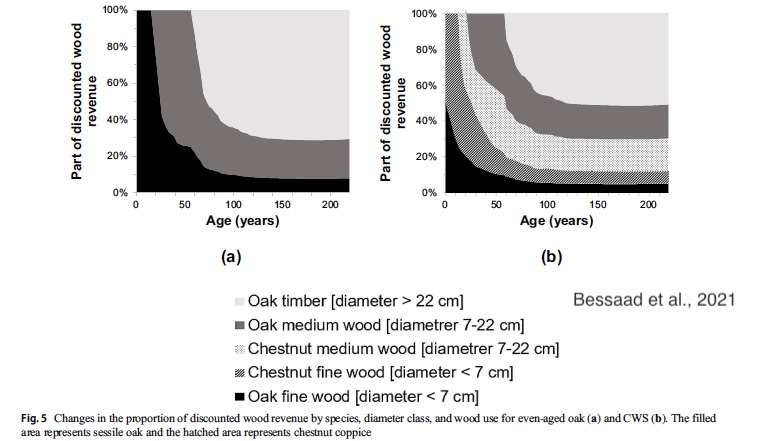DEFIFORBOIS
|
Article Scientifique Abdelwahab Bessaad, Jean-Philippe Terreaux, Nathalie Korboulewsky Assessing the land expectation value of even-aged vs coppice-with-standards stand management and long-term effects of whole-tree harvesting on forest productivity and profitability Annals of Forest Science, 2021, 78:57. Key message: Whole-tree harvesting makes forests more profitable than conventional harvest as long as the impact on tree growth remains under 2.3% for even-aged oak (Quercus petraea (Matt.) Liebl.) and 3.4% for sweet chestnut (Castanea sativa Mill.) coppice with oak standards. Coppice-with-standards may have potential to be more profitable than even-aged oak in case of 50% rise in fuelwood prices with 10% decrease in timber prices.Context: Making the shift to renewable energy sources requires increasing biomass removal from the forest in a sustainable way. Today, the most common practice for forest biomass extraction is whole-tree harvesting rather than conventional harvest in which only stems are harvested or sometimes branches larger than 7 cm in diameter. However, intensive biomass harvesting can certainly increase economic profitability but it could affect long-term forest productivity because more nutrients are exported from sites. Aims: We explored the land expectation value of even-aged oak (Quercus petraea (Matt.) Liebl.) and sweet chestnut (Castanea sativa Mill.) coppice with oak standards under different discount rates and wood prices scenarios, tree mortality triggered by climate variation as well as the effects of a decrease in forest productivity due to whole-tree harvesting on the land expectation value (LEV). Methods: We modeled two plausible harvesting scenarios for both stands and assessed their LEV. We first analyzed the sensitivity of the valuation results to discount rate, wood prices changes, and increased tree mortality rates. Second, we compared conventional harvest to whole-tree harvesting in which removing the fine wood implies a decrease in tree growth over the long term (between 1 and 10%). Results: In the current economic situation, the LEV of even-aged oak is higher than coppice-with-standards but this situation could be reversed in case of rising energy prices and lower timber prices in the future. The variation of the discount rate has a significant impact on the LEV but 3% seems to be adequate for European forests. A gradual increase in annual tree mortality rate of 0.6 and 0.9% along even-aged and CWS rotation, respectively, reduced the LEV by half, while increased mortality with constant rates along the rotations had more negative effect on the LEV than gradual increases: 0.4–0.5% increases in mortality rates reduced both LEV’s by half. Whole-tree harvesting is able to improve the LEV for both stands by 36 to 64% compared to conventional harvest; but this improvement of LEV only lasts as long as the impact on tree growth remains under 2.3 and 3.4%, respectively, for even-aged oak stand and coppice-with-standards. Conclusion: Whole-tree harvesting system increases forest profitability as long as the sustainability guidelines for biomass harvesting are respected. With the increased demand for fuelwood, the coppice-with-standards regime may become financially attractive once again and fulfill a multitude of forest owner objectives with a wide range of additional options. Keywords: Fine wood; Fuelwood; Sessile oak; Chestnut coppice; Faustmann model; Optimal rotation length A consulter ici : https://link.springer.com/article/10.1007/s13595-021-01071-2  |